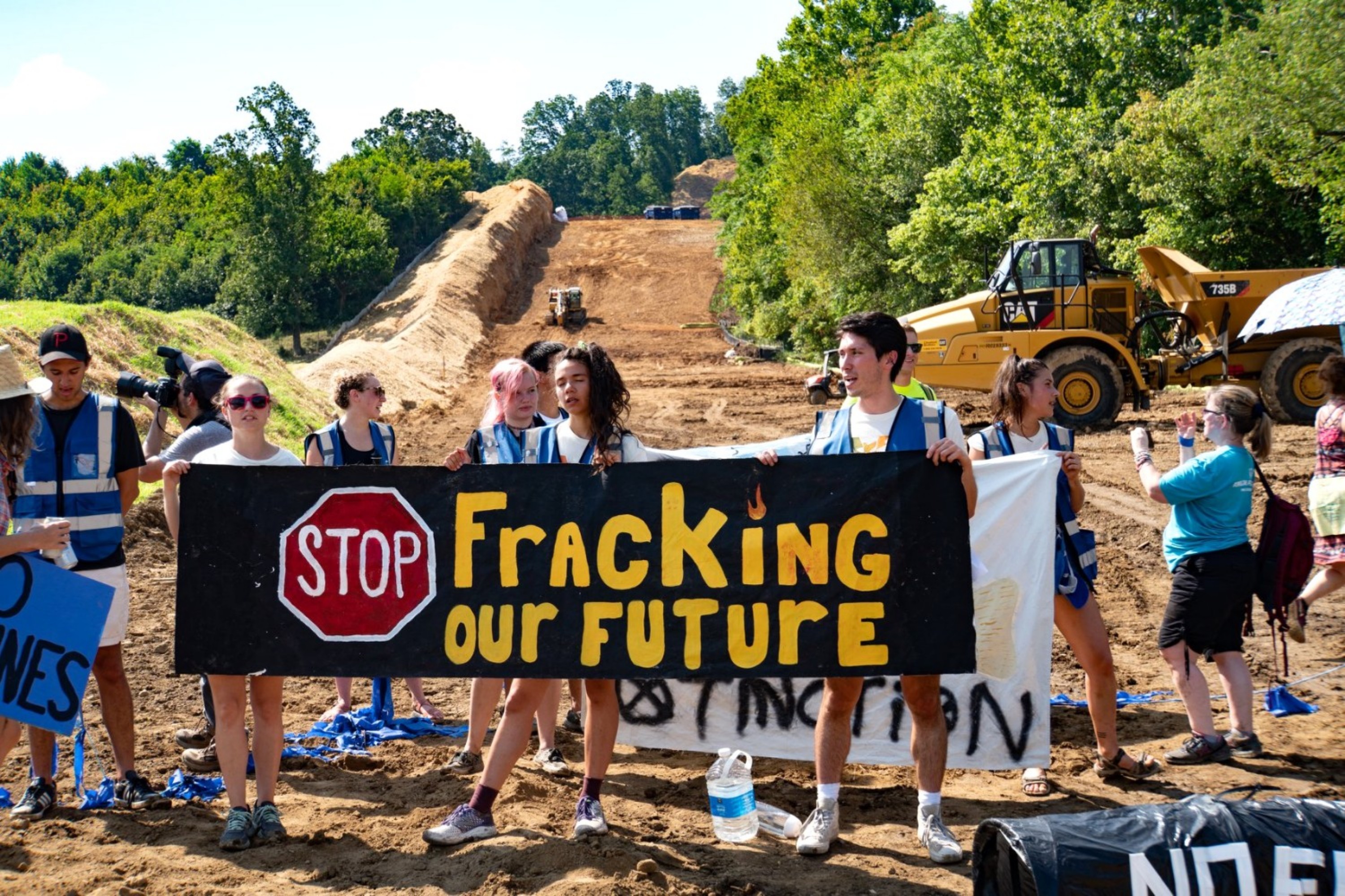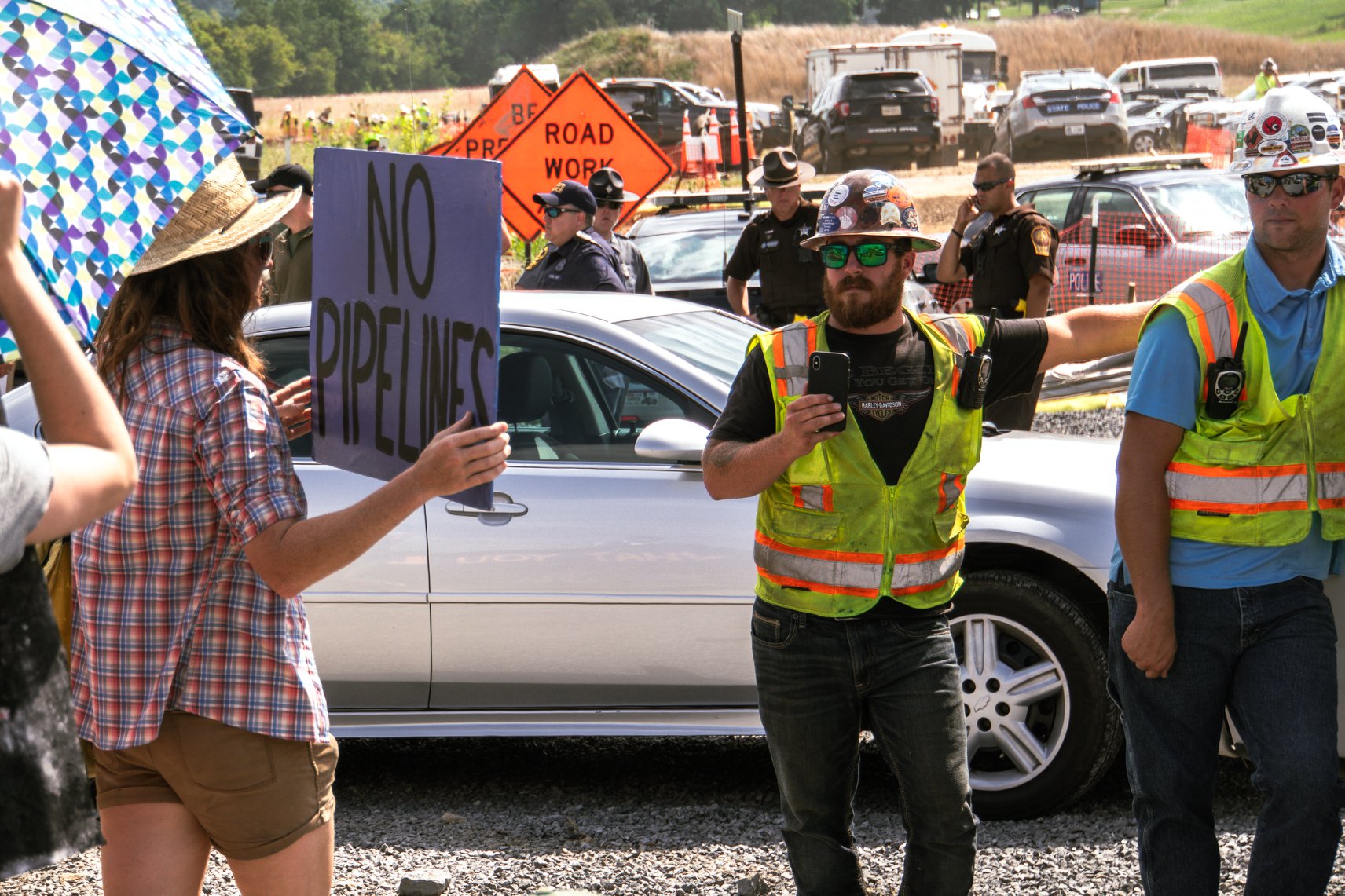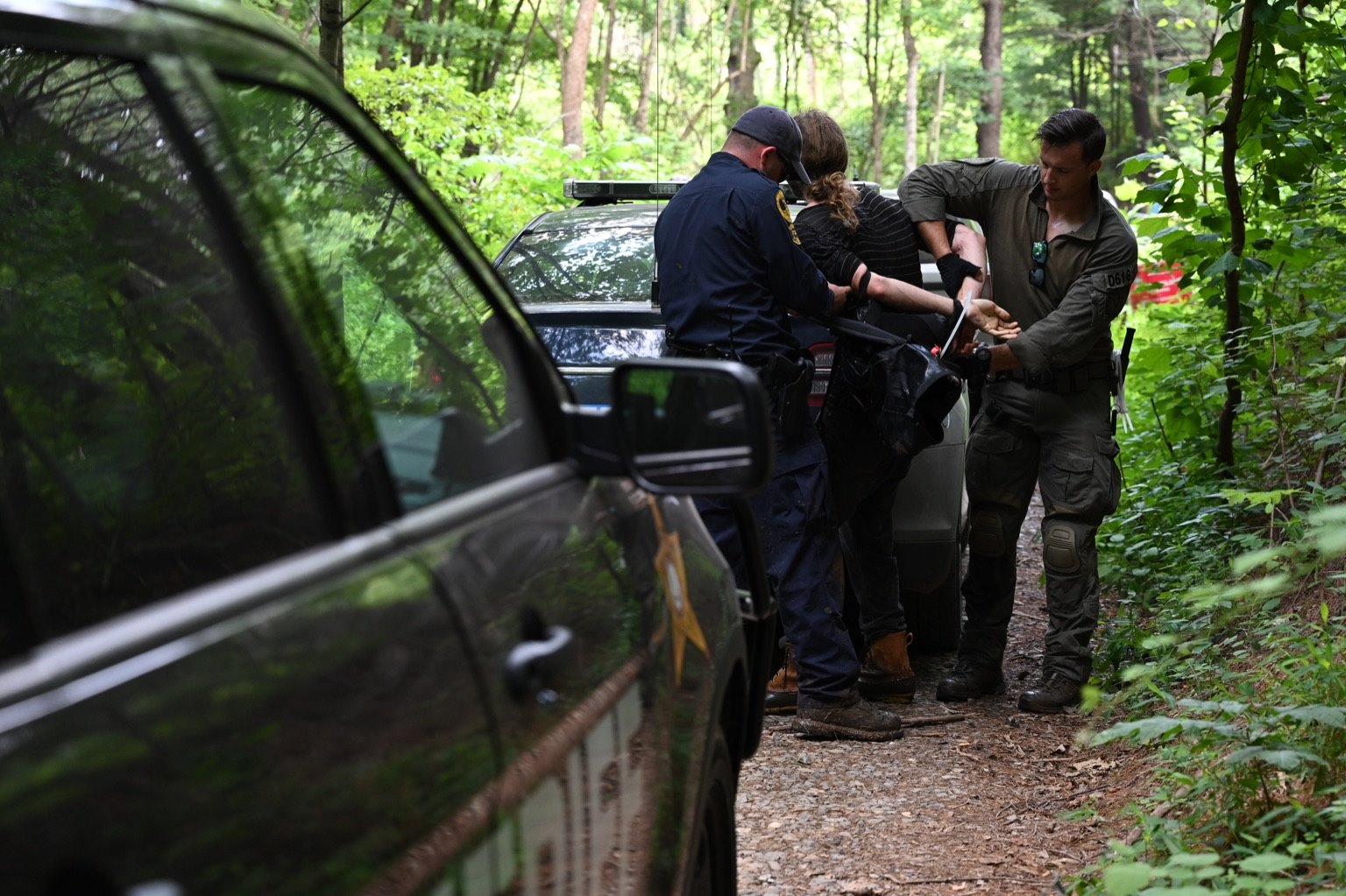Pipelines Continue to Face Obstacles

On July 20, 40 demonstrators at a Mountain Valley Pipeline construction site in Cove Hollow, Va., stalled construction for about an hour. Photo courtesy of FightingFox Photography
Editor’s Note: Aug. 27, 2019
The online version of this story was updated to include significant developments in pipeline news, listed below.
- On Aug. 21, seven environmental groups including Appalachian Voices, the publisher of this newspaper, petitioned the U.S. Fourth Circuit Court of Appeals to cancel a key permit for and stop work on the Mountain Valley Pipeline. The permit was issued by the U.S. Fish and Wildlife Service in 2017 and allows developers to cut through endangered species’ habitat. The groups argue that Mountain Valley’s voluntary suspension is not sufficient to prevent harm to endangered species in the area, noting in the motion that Mountain Valley construction continues in the species’ habitat. Both pipeline developers and the Fish and Wildlife Service oppose cancelling the permit and plan to issue written arguments, according to the Roanoke Times.
- On Aug. 15, Mountain Valley Pipeline developers voluntarily suspended certain construction activities on the fracked-gas project in areas where it could harm several threatened and endangered species. The suspension came three days after several environmental groups including Appalachian Voices, the publisher of this newspaper, sued the U.S. Fish and Wildlife Service to reverse and review its permit that allows developers to harm the species.
Appalachian Voices’ Peter Anderson told the Virginia Mercury that “the Federal Energy Regulatory Commission should put a real stop to construction while these issues are pending,” and claimed that Mountain Valley is attempting to gloss over knowledge “that construction poses dire threats to these species and their habitats.”
The U.S. Fourth Circuit Court of Appeals, which will be reviewing the case, canceled a similar FWS permit for the Atlantic Coast Pipeline in August 2018. The voluntary suspension encompasses approximately 95 miles of the pipeline’s route, according to The Roanoke Times.
- On Aug. 15, two protesters locked themselves to Mountain Valley Pipeline construction equipment and halted work for more than six hours. One of the protesters was being held without bail as of Aug. 16, and the other was charged with two misdemeanors and released after meeting the $1,500 bail, according to Appalachians Against Pipelines, a group that represents protesters and raises funds to help with legal fees.
- On Aug. 13, two environmental groups petitioned the North Carolina Department of Environmental Quality to cancel a key water permit for the Atlantic Coast Pipeline. North Carolina Climate Solutions Coalition and Friends of the Earth argue that the department lacked information on the pipeline’s potential expansion into South Carolina at the time of the permit’s approval. Additionally, the groups stated that added infrastructure in Robeson County is more than the original application described and will disproportionately harm Native American residents.
The Atlantic Coast Pipeline suffered two major setbacks in late July.
On July 26, the U.S. Fourth Circuit Court of Appeals cancelled a U.S. Fish and Wildlife Service permit that would have allowed developers of the 600-mile fracked-gas pipeline to harm threatened and endangered species. The court suspended the permit in December 2018, and the agency re-submitted it soon after.
“In fast-tracking its decisions, the agency appears to have lost sight of its mandate under the [Endangered Species Act]: ‘to protect and conserve endangered and threatened species and their habitats,’” reads the court’s opinion.
On July 24, U.S. District Judge Terrence Boyle extended a suspension on Atlantic Coast developers’ ability to use eminent domain to seize private land without paying landowners upfront. Boyle wrote that his decision was based partially on “the uncertainty of the pipeline’s route in light of ongoing litigation.”
The suspension is set to be in effect through Sept. 23. Environmental groups including Appalachian Voices, the publisher of this newspaper, applauded both court decisions.
In late June, the U.S. Solicitor General and Atlantic Coast Pipeline developers submitted separate requests to the U.S. Supreme Court to intervene in an ongoing legal battle over whether the fracked-gas pipeline can cross the Appalachian Trail. West Virginia Attorney General Patrick Morrisey and representatives from 15 other states threw their support behind the plea to the Supreme Court in a July 31 press conference.
The U.S. Fourth Circuit Court of Appeals stopped construction across the trail and in the George Washington and Monongahela national forests in December. The federal appeals court mandated that the agency had violated two laws and did not have authority to give Atlantic Coast developers a right-of-way. President Trump’s solicitor general and the 16 state representatives disagree.
The Supreme Court has not yet decided whether to hear the case. The court receives thousands of requests each nine-month term and only chooses to hear around 80 oral arguments.
The pipeline is backed mostly by Dominion Energy and Duke Energy. At least six Virginia state legislators who own Dominion stock stand to profit if the pipeline is completed and have advocated heavily for the project, according to nonprofit news outlet Truthout.
Actions taken by these lawmakers include pro-pipeline op-eds, letters endorsing the project sent to U.S. senators or federal regulators, and being listed on Atlantic Coast’s website as official supporters. Truthout reports that Dominion donated thousands of dollars to each of the legislators’ reelection campaigns.
In April 2016, Dominion gave $2,000 to State Sen. Bill DeSteph — his largest donation from the utility — a month after DeSteph sent a letter endorsing the pipeline to Virginia’s U.S. senators, according to Truthout. And in April 2017, Dominion handed $7,500 to State Sen. Tommy Norment one week after he signed a letter to the Federal Energy Regulatory Commission supporting the pipeline.
On July 11, 18 Virginia state delegates and senators sent a letter to FERC urging a stop-work order for the pipeline and a revocation of its certificate of public necessity while the commission reassesses whether it is needed. Noting that Atlantic Coast is a joint venture of Dominion, Duke and Southern Company, the lawmakers wrote that “the pipeline’s now $7.8 billion price tag would be passed on to captive ratepayers under the developers’ plan.”
In March, the West Virginia House passed a resolution 80 to 17 endorsing the Atlantic Coast Pipeline and condemning the citizens’ groups filing lawsuits against it. According to records recently obtained by ProPublica, the resolution was authored by a Dominion Energy lobbyist.
“It was essentially the legislative branch saying we don’t want pipeline companies to follow the law, and that’s a very irresponsible stance for the legislature to take,” Del. Evan Hansen, who voted against the resolution, told ProPublica.
Mountain Valley Pipeline

MVP construction at the family-owned Four Corners Farm in Rocky Mount, Va., has caused significant erosion problems. Photo by Morgan Ashcom
As the 303-mile fracked-gas behemoth stretches into its second year of construction, its environmental problems continue to stack up.
State regulators in Virginia and West Virginia have logged more than a dozen notices of violation against the company. But volunteers with Mountain Valley Watch, a grassroots group that tracks the pipeline’s construction violations, had recorded 646 problems as of Aug. 1, 2019. These range from sediment-laden rainwater washing into streams to one case where two 80-foot pipe segments were carried hundreds of feet by stormwater onto a private landowner’s cornfield in Franklin County, Va.
Mountain Valley representatives have continued to blame incidents such as these on “unprecedented rainfall.” However, an analysis of the company’s filings with FERC indicate otherwise.
Jacob Hileman, an environmental hydrologist with the Stockholm Resilience Centre, a nonprofit independent research institute, pored through a database of “variance requests” put together by Protect Our Water, Heritage, Rights, an umbrella organization for local groups opposed to Mountain Valley. Pipeline companies are required to file a variance request whenever they attempt anything not in the original work plan. Mountain Valley had filed 125 variance requests with FERC as of late July.
In a July 15 column in Virginia Mercury, Hileman wrote that a third of the requests were related to fixing erosion problems. He noted that from Oct. 18, 2018 to April 5, 2019, Mountain Valley requested 23 erosion-related variances in a single 10-mile section.
“These variances are just the tip of the iceberg; they represent only those erosion events that required MVP to deviate from its work plan in order to address,” wrote Hileman in the publication. “It is important to remember that uncontrollable erosion is not just harmful to the environment that we depend on for our health and livelihoods, erosion jeopardizes the integrity of the pipeline itself.”
On July 26, federal regulators issued a draft environmental impact statement for the Mountain Valley Pipeline Southgate extension. The project would extend the unfinished pipeline by 73 miles from Pittsylvania County, Va., into North Carolina’s Rockingham and Alamance counties, and would require a new compressor station to be built at the Virginia starting point.
The Federal Energy Regulatory Commission will be accepting public comments on the draft environmental impact statement through Sept. 16. Read more about MVP Southgate here.
Stalling Construction
While construction is underway along most of Mountain Valley’s route, legal challenges continue to prevent work at water crossings and through national forests, including a section of the Appalachian Trail. Work on Dominion Energy’s Atlantic Coast Pipeline, which is slated to run through West Virginia, Virginia and North Carolina, remains stalled due to numerous similar lawsuits.
In December 2018, a federal appeals court ruled that the U.S. Forest Service had improperly given permission to Atlantic Coast developers to cut across the Appalachian Trail. Since Mountain Valley also has plans to cut across the national scenic trail, its crossing could also be endangered by the ruling.
In June, lead Mountain Valley Pipeline developer EQM Midstream revealed a plan that may allow them to cut across the AT. The proposal, disclosed in a filing with the U.S. Securities and Exchange Commission, would increase the fracked-gas pipeline’s cost from $4.6 billion to $5 billion and push the projected completion date from late 2019 to mid-2020.
If approved, EQM would trade a section of land owned by Mountain Valley next to the Jefferson National Forest to the U.S. Department of Interior in exchange for federal approval to cross the national scenic trail at the original location, according to the Roanoke Times.
With ongoing delays for both pipeline projects, sections of pipe have sat outside for more than a year — leading to worries about degradation of a chemical coating meant to protect against corrosion.
On July 27, Mountain Valley developers told the Federal Energy Regulatory Commission that the coating presents no known dangers to public or environmental health. The federal agency asked for information regarding the coating, which contains suspected human carcinogens, on July 10.
Concerns center on ultraviolet radiation breaking down the chemical and causing harmful toxins to either evaporate into the air or leak into groundwater if the pipe is buried. A thinner anti-corrosion coating could also be less effective and increase the risk of a gas leak or explosion.
Bill Limpert, a retired environmental regulator and resident of Bath County, Va., requested information about the coating from the manufacturer, 3M. A letter from the company stated that some of the compounds “will be toxic to aquatic species.” However, the company does not expect any of the compounds to become progressively concentrated up the food chain.
According to communication between Limpert and the Pipeline and Hazardous Materials Safety Administration, Mountain Valley representatives claim they are rotating pipe sections over time to reduce damage from sunlight. Atlantic Coast developers, however, stated that they have not taken measures to prevent damage from UV light.
A Series of Protests
On Aug. 2, a federal judge denied an injunction filed by Mountain Valley Pipeline developers to use U.S. Marshals to forcefully remove tree-sitters in Ellison, Va., that have blocked construction for more than 330 days. Mountain Valley first issued the request in December 2018.
Tensions between pipeline security forces and protesters escalated in July at several locations, including near the Elliston tree-sit.

On July 20, 40 demonstrators at a Mountain Valley construction site in Cove Hollow, Va., stalled construction for about an hour. Photo courtesy of FightingFox Photography
On July 15, a group of protesters blocked access to a worksite roughly six miles from the tree-sit. While all of the demonstrators eventually dispersed after police arrived, Giles County, Va., resident Jammie Hale was arrested and charged with assault after he exchanged words with and pointed his cane at one of Mountain Valley’s security contractors, according to the Roanoke Times. Hale, who often protests the pipeline, told the publication that his farm’s water system stopped working after the pipeline company began construction.
On July 19, protesters blocked work near the Elliston tree-sit and police were called. After several hours, work resumed on a hillside above where several demonstrators were located, according to Appalachians Against Pipelines, a group that represents protesters and raises funds to help with legal fees. Then, an excavator dislodged a large stump and root ball that barreled downhill toward several demonstrators, who dodged out of the way.
“We heard a tumbling sound coming from the hill, and before it could register it was right there, and all we could do — me and my dog, everybody — we just ran,” said a demonstrator called Crystal in a video on Appalachians Against Pipelines’ Facebook page.
A few minutes later, a Mountain Valley employee overturned an excavator. The operator did not suffer major injuries.
“They flipped an excavator and almost killed five people today, and continued working,” Crystal said in the video. A few days earlier on July 16, a Mountain Valley worker rolled over an excavator in Summers County, W.Va. The operator was not severely injured.
On July 20, 40 demonstrators with signs and banners stopped work at a Mountain Valley construction site a few miles away from the tree-sit for about one hour. Then, according to Appalachians Against Pipelines, police arrived at the tree-sit — where no construction work was being conducted — and arrested three people for trespassing, two of whom were not within the easement. The police also destroyed one of the demonstrators’ shelters and confiscated hammocks, tarps and other personal items.

Police arrested three nonviolent protestors for allegedly trespassing on the Mountain Valley Pipeline easement. Photo courtesy of Appalachians Against Pipelines
“The cops pulled in, got out of their cars, straightened their belts, and then four to five cops tackled our friend in the road where she was taking pictures, entirely off the easement and out of the limit of disturbance,” one witness told Appalachians Against Pipelines.
In addition to these events, two separate demonstrators blocked pipeline construction by locking themselves in the easement near the tree-sit for several hours on July 13 and 18. Both were arrested and charged with misdemeanors. Another protester locked themselves to an excavator on June 28 in Montgomery County, Va., stopping construction for six hours before being arrested and charged with two misdemeanors.
On June 26, a nonviolent protester who locked themselves to an excavator in Summers County, W.Va., for several hours was arrested and charged with felony threats of terrorist acts along with two misdemeanors. They are the third person in three months to be charged with a felony for blocking Mountain Valley Pipeline construction.
On July 15, Sarah Murphy finished her 875-mile journey on horseback roughly paralleling the route of the 600-mile Atlantic Coast Pipeline. The Nelson County, Va., resident started the journey on Sept. 26 in Staunton, Va., and traveled for nearly 10 months before reaching the endpoint in Robeson County, N.C.
“I really just wanted to learn more about what was happening other than what Dominion was putting out there,” says Murphy, noting that pipeline developers used eminent domain to seize several of her friends’ land.
While on the road, Murphy says that people approached her and told stories about problems with the pipeline. She heard several cases of pipeline crews cutting livestock fences without alerting landowners, which led to animals getting out, and of an incident where cows died after eating toxic leaves from trees that workers had felled and failed to remove quickly. Murphy only saw active construction for a fraction of the ride. She states that she has become frustrated with Dominion for blaming activists for stalling construction.
“We are just asking for them to be held accountable and feeling like they didn’t go through the proper channels for this thing to happen,” says Murphy. “Here they’re blaming us for people not having jobs, but we’re not the ones that put this thing into play without making sure that everything was properly vetted.”
NEWS UPDATE: Aug. 1, 2019
Deadly Pipeline Explosion in KY
On Aug. 1, a ruptured gas pipeline in Lincoln County, Ky., caused a massive explosion that killed one person, injured five, destroyed railroad tracks and set fire to several nearby mobile homes. Emergency services evacuated dozens from the area.
The explosion occurred along the Texas Eastern Transmission pipeline, which stretches nearly 9,000 miles from Texas to New York City. The 30-inch diameter pipeline is owned and operated by Canada-based Enbridge, Inc.
In January, a section of the same pipeline exploded in rural Noble County, Ohio, injuring two and damaging three homes. Another pipeline owned by Enbridge exploded in October 2018 in western Canada. While there were no reported injuries, the blast forced around 100 members of the nearby Lheidli T’enneh First Nation from their homes, The Globe and Mail reports.
CORRECTION: Sept. 10, 2019
Jacob Hileman with the Stockholm Resilience Centre was incorrectly referred to as Jason Hileman in an earlier version of this article. The Appalachian Voice regrets this error.
Editor’s Note: This article was updated on Aug. 27, 2019, to include new developments.
Editor’s Note: This article was updated on Aug. 16, 2019, to include new developments.
Editor’s Note: This article was updated from the print version on Aug. 7, 2019, to include new information.
Related Articles
Latest News
More Stories

Leave a comment
Your email address will not be published. Required fields are marked *





Leave a Comment